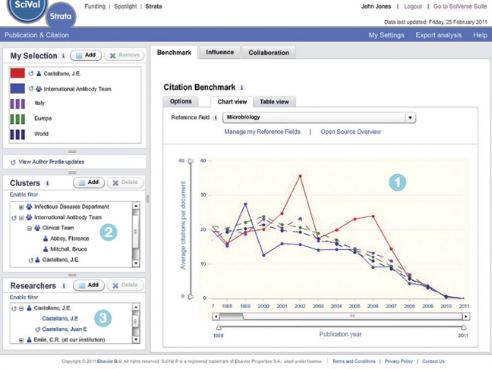SciVal Strata, a new project from Elsevier, is a web-based modeling tool that allows users to play scientists in teams in much the same way football fans do with players. Call it Madden NSF.

Dr. Lisa Colledge, project manager for Strata, identified the problem that gave rise to its creation: “At the end of the day everything comes back to resources.”
Whether you’re putting together a team for a research project, applying for a grant, evaluating grant applications or looking to prove your own worth to a project or institution, a modeling tool that can quantify that worth dynamically and justify the expenses involved could be valuable.

The tool is a dynamic, customizable modeler that allows a user to add and subtract scientists and specialists to a team and anticipate the change that would make in the team’s efficiency. A set of tabs allow changes to benchmarks, personnel and influence over time (on science in general, not just a specific project). The interface is very recognizable, with drag-and-drop scientists (is this the first time that phrase has ever been written?), which outputs into various charts and graphs.
In much the same way that a football player in a fantasy league or video game would be represented by his stats, so is the scientist or specialist in question. According to Dr. Colledge, the scientists are represented by a range of data, from SciVerse Scopus, an abstract and indexing database, articles from all kind of publications and references in those publications, as well as output and citation data which can be customized, and is dynamic and current.

What are the chances of those of us at home playing along? (Who wouldn’t want a chance to see how Niels Bohr and Stephen Hawking would effect the development of the steam engine? Or whether Marie Curie or Richard Feynman would be more effective in helping Danny Dunn with his homework machine?)
Slight.
The tool is sold to universities and other research institutions and users will need to belong to one. If such a tool is even roughly analogous with academic journals, the cost would prove prohibitive for the Average BA-holding Joe. Maybe an academic game company could license the engine and data and give us the Max Planck-Laura Maria Caterina Bassi smackdown for which we have so long waited.


















